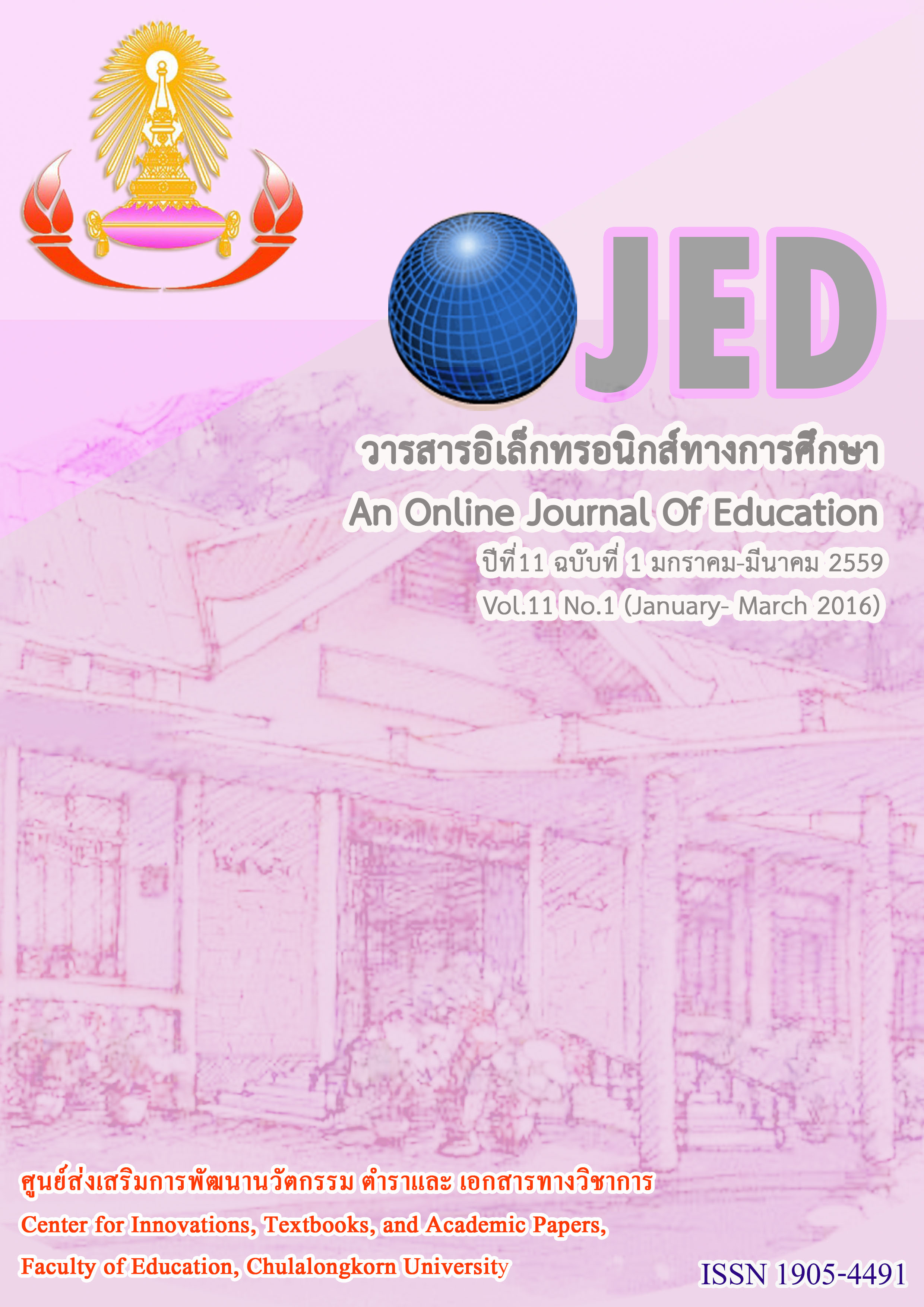ผลของการใช้การเรียนรู้สืบสอบแบบแนะนำเน้นกระบวนการที่มีต่อมโนทัศน์ทางเคมีและความสามารถในการวิเคราะห์ของนักเรียนมัธยมศึกษาตอนปลาย EFFECTS OF USING PROCESS ORIENTED GUIDED-INQUIRY LEARNING (POGIL) ON CHEMISTRY CONCEPTS AND ANALYZING ABILITY OF UPPER SE
Keywords:
การเรียนรู้สืบสอบแนะนำเน้นกระบวนการ, มโนทัศน์ทางเคมี, ความสามารถในการวิเคราะห์, EFFECTS OF USING PROCESS ORIENTED GUIDED-INQUIRY LEARNING (POGIL), CHEMISTRY CONCEPTS, ANALYZING ABILITYAbstract
การวิจัยครั้งนี้มีวัตถุประสงค์เพื่อ 1) ศึกษามโนทัศน์ทางเคมีของนักเรียนมัธยมศึกษาตอนปลายก่อนเรียนและ หลังเรียนโดยใช้การเรียนรู้สืบสอบแบบแนะนำเน้นกระบวนการ 2) เปรียบเทียบมโนทัศน์ทางเคมีของนักเรียนมัธยมศึกษาตอนปลายก่อนเรียนและหลังเรียนโดยใช้การเรียนรู้สืบสอบแบบแนะนำเน้นกระบวนการ 3) ศึกษาความสามารถ ในการวิเคราะห์ของนักเรียนมัธยมศึกษาตอนปลายก่อนเรียนและหลังเรียนโดยใช้การเรียนรู้สืบสอบแบบแนะนำ เน้นกระบวนการ 4) เปรียบเทียบความสามารถในการวิเคราะห์ของนักเรียนมัธยมศึกษาตอนปลายก่อนเรียนและหลังเรียนโดยใช้การเรียนรู้สืบสอบแบบแนะนำเน้นกระบวนการ กลุ่มตัวอย่างที่ใช้ในการวิจัยนี้ คือ นักเรียนชั้นมัธยมศึกษาปีที่ 5 ปีการศึกษา 2559 โรงเรียนขนาดใหญ่พิเศษ จำนวน 1 ห้องเรียน เครื่องมือที่ใช้ คือ แบบวัดมโนทัศน์ทางเคมี ที่มีค่าความเที่ยง 0.82 ค่าความยากง่ายอยู่ในช่วง 0.23-0.80 และแบบวัดความสามารถในการวิเคราะห์ มีค่าความเที่ยงเท่ากับ 0.71 ค่าความยากง่ายอยู่ในช่วง 0.28-0.79 วิเคราะห์ข้อมูลด้วยสถิติค่าเฉลี่ย ค่าเฉลี่ยร้อยละ ส่วนเบี่ยงเบนมาตรฐาน และทดสอบสมมติฐานด้วยสถิติทดสอบค่าที
ผลการวิจัยสรุปได้ดังนี้ 1) นักเรียนที่เรียนโดยใช้การเรียนรู้สืบสอบแบบแนะนำเน้นกระบวนการมีคะแนนเฉลี่ยของมโนทัศน์ทางเคมีคิดเป็นร้อยละ 76.67 ซึ่งสูงกว่าเกณฑ์ที่กำหนดคือร้อยละ 70 โดยพบว่าร้อยละของคะแนนเฉลี่ย มโนทัศน์เชิงพรรณนาและเชิงทฤษฎีมีค่าเท่ากับ 82.45 และ 72.81 ตามลำดับ 2) นักเรียนที่เรียนโดยใช้การเรียนรู้สืบสอบแบบแนะนำเน้นกระบวนการมีคะแนนเฉลี่ยของมโนทัศน์ทางเคมีหลังการทดลองสูงกว่าก่อนการทดลองอย่างมีนัยสำคัญทางสถิติที่ระดับ .05 โดยพบว่าคะแนนเฉลี่ยของมโนทัศน์เชิงพรรณนาและมโนทัศน์เชิงทฤษฎีหลังการทดลองสูงกว่า ก่อนการทดลองอย่างมีนัยสำคัญทางสถิติที่ระดับ .05 3) นักเรียนที่เรียนโดยใช้การเรียนรู้สืบสอบแบบแนะนำ เน้นกระบวนการหลังการทดลองมีคะแนนเฉลี่ยความสามารถในการวิเคราะห์คิดเป็นร้อยละ 78.43 4) นักเรียนที่เรียน โดยใช้การเรียนรู้สืบสอบแบบแนะนำเน้นกระบวนการหลังการทดลองมีคะแนนเฉลี่ยความสามารถในการวิเคราะห์ ทั้ง 3 ประเภท สูงกว่าก่อนการทดลองอย่างมีนัยสำคัญทางสถิติที่ระดับ .05
The purposes of this research were to 1) study the chemistry concepts of students learning through process-oriented guided-inquiry learning, 2) to compare the chemistry concepts of students between before and after learning through the process-oriented guided-inquiry learning , 3) tostudy the analytical ability of students learning through process-oriented guided-inquiry learning, and 4) to compare the analytical ability of students before and after learning through process-oriented guided-inquiry learning. The sample group was one class of extra-large secondary school, in the 2016 academic year. The research instruments were a chemistry concepts test with reliability at 0.82 and a level of difficulty between 0.23-0.80, and an analytical ability test with reliability at 0.71 and a level of difficulty between 0.28-0.79. The collected data were analyzed by using means, means of percentage, standard deviation and the hypothesis was tested by using t-test. The research findings were summarized as follows: 1) After the experiment, students who learned through process-oriented guided-inquiry learning had an average score in chemistry concepts of 76.67 percent, which was higher than the criterion scores at 70 percent. The research findings are that descriptive and theoretical concepts are 82.45 and 72.81 percent, respectively. 2) After the experiment, students who learned through process-oriented guided-inquiry learning had average scores in chemistry concepts higher than before the experiment at a 0.05 level of significance. The research findings showed that students had higher average scores with both descriptive and theoretical concepts, than before the experiment at a 0.05 level of significance. 3) After the experiment, students who learned through process-oriented guided-inquiry learning had average scores in analytical ability of 78.43 percent. 4) After the experiment, students who learned through process-oriented guided-inquiry learning had average scores in analytical ability of all 3 types higher than before the experiment at a 0.05 level of significance.




